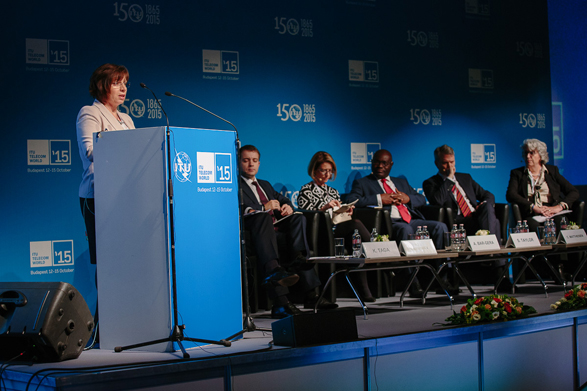NMHH: Developments in the infocommunications sector usher in a new digital era
nullProgress in our digital world is mainly hindered by the digital divide between businesses and consumers. Everyone should have the means to close this gap. In addition to access to modern technical equipment, this also entails media awareness, emphasised Monika Karas, President of Hungary’s National Media and Infocommunications Authority, at the ITU Telecom World 2015 international conference held between 12–15 October. As one of the twenty founding members, Hungary hosts the event at a worthy venue to close the 150th jubilee year in the history of ITU (International Telecommunication Union) and, also, to allow Hungarian infocommunications businesses to introduce themselves to the international audience of professionals.

In her opening speech, President of NMHH Monika Karas stressed that technology and innovation always go hand-in-hand; however, the link between the two has never been stronger. Effective technological progress is no longer an exclusive privilege of large corporations but it is now available to everyday consumers. This is exactly why ensuring a free flow of infocommunications services is so important so that neither infrastructural characteristics, nor state borders could prevent those willing to join the virtual world connected by the Internet. Modern infocommunications consumers are not only conscious in their use of these technical devices but they also fuel the development of services as their expectations grow, which service providers, in turn, are forced to follow through. Thus, digital progress is important not only in and of itself but it is also a driving force for progress in other economic sectors.
Innovation and the resulting change influence society and business alike. Cross-sectoral partnerships and new forms of collaboration offer the chance to introduce innovative solutions into households. ITU Telecom World 2015 is a forum to discuss, among other things, these impacts and forms of cooperation where constantly emerging new technological solutions redefine the industry day after day: 5G-based mobile communication technology of the future, regulatory issues and the evolution of IoT and cloud solutions.
Hosting the event in Budapest is exceptionally important for NMHH as the professionals working at the Hungarian authority have, since the very beginning of the regulatory process of telecommunications and infocommunications, contributed to sectoral development with a number of scientific works and regulatory proposals. NMHH is continuously involved in the work of various ITU working groups. As a result, NMHH can represent Hungarian interests in creating the regulatory framework, and obtain new know-how on future infocommunications technologies to use in long-term development projects in Hungary.
IT Telecom World 2015 is a four-day global event, a meeting place for developers of information and communication technology, government representatives, regulatory authorities, key industry players, emerging start-up companies as well as media representatives from Hungary and abroad to demonstrate the latest trends in technology, to build new industry and government ties and consolidate existing ones. Companies, organisations and even entire countries can represent themselves at the event that offers a unique opportunity for emerging markets to introduce themselves and become visible on the world scene. The latest achievements and innovations in the ICT sector are discussed by highly experienced professionals. In addition, small and medium businesses, an element of the ICT economy to reckon with, are offered a great chance to introduce their products and ideas to the entire world. In addition, the event also facilitates meetings between heads of states, professional organisations of the UN, regulatory authorities and managers of industrial businesses.
International Telecommunication Union (ITU)
ITU is a UN organisation specialised in telecommunications and coordinating the telecommunications industry worldwide. The Constitution lists the organisation’s objectives, which include, among other things, extending the usefulness of telecommunications technologies to people all over the world and promoting telecommunications services to facilitate establishing peaceful relations. In order to realise its goals, ITU regulates the international allocation of the radio frequency spectrum (ITU-R), provides for the worldwide standardisation of telecommunications (ITU-T) and offers help to developing countries (ITU-D). Founded by 20 European states in 1865, ITU now has 191 member states. Hungary joined the organisation in 1866.